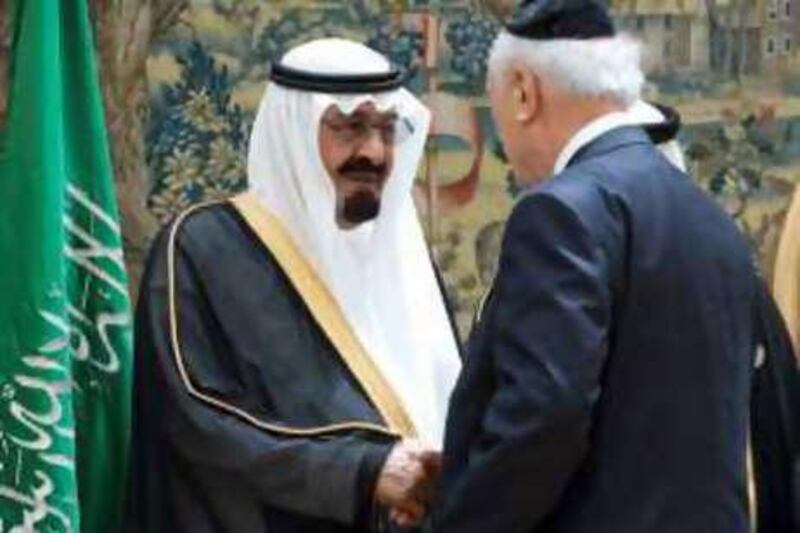NEW YORK // King Abdullah's interfaith debate at UN headquarters will likely become the world's most well-attended cross-religious parley to date, with as many as 30 heads of state set to talk including George W Bush, the US president, the Saudi monarch and King Juan Carlos of Spain. Rather than the scholars, academics and clerics that typically address inter-religious seminars, this two-day summit will boast a string of headline speakers discussing ways to bridge gaps between faiths and cultures. The Saudi monarch has been proactive in orchestrating his latest in a string of religious events, which includes the Madrid meeting of Jews, Muslims and Christians in July, and multi-denominational Muslims in Mecca the previous month. Outlining his purpose for the upcoming symposium, King Abdullah was quoted this week as having said terrorist acts had left a stain on Islam that "nothing can purify except for the extension of Muslims' hands to their brothers in other religions". UN officials eagerly anticipate any opportunity to host big name politicians, with Ban Ki-moon, the UN secretary general, saying the event will promote global "harmony and reconciliation". The world's top diplomat dispatched his envoy, Terje Roed-Larsen, to Riyadh and the Vatican for last-minute talks this week, although it remains unclear whether Pope Benedict XVI will make a second UN address this year. Miguel d'Escoto Brockmann, president of the General Assembly, invited heads of state from all 192 UN members and has keenly unveiled the names of expected monarchs, presidents and senior politicians. Shimon Peres, Israel's president, Tzipi Livni, the foreign minister and leader of the Jewish state's ruling Kadima party, Gloria Arroyo, the president of the Philippines, and King Abdullah II of Jordan are among a cast of world leaders that will add weight to the Saudi monarch's enterprise. The UAE delegation features Sheikh Hamad bin Mohammed Al Sharqi, Supreme Council member and Ruler of Fujairah, accompanied by Sheikh Abdullah bin Zayed, Minister of Foreign Affairs, and Reem al Hashimi, the Minister of State. Enrique Yeves, Mr d'Escoto's spokesman, said with between 20 and 25 heads of state already expected to speak, the level of "participation is very good", and the Saudi initiative will likely be "a big success". But critics said this does not overcome the problems in Riyadh. In the run-up to the Nov 12-13 summit, activists in the United States are contacting UN missions and urging diplomats to discuss the violations of human rights that are perpetrated against Saudi Arabia's minority groups. Ali al Ahmed, the director of the Washington-based Institute for Gulf Affairs, fears the event will be nothing but a "photo-opportunity" for publicity-hungry leaders, offer little real analysis on interfaith issues and serve only to "clean the image of Saudi Arabia and endorse the kingdom's oppressive religious policy. "Non-Muslims are not allowed to practice their faith or carry their religious symbols." In the 2008 International Religious Freedom Report, the US state department identified Saudi Arabia as one of eight "countries of particular concern" for having "engaged in or tolerated particularly severe violations of religious freedom". Saudi diplomat Samer al Kharashi said individuals of all races and religions within the kingdom are protected by law. Mr Ban refused to comment on Saudi Arabia's treatment of religious minorities. Mr Yeves defended the event, and said that although an initiative of King Abdullah, the event was a typical UN parley that could highlight valuable religious and cultural ideas during the global economic meltdown. "Member countries are going to discuss the common values that we have in our different cultures," Mr Yeves said. "Whether they are from religions, whether they are from different cultures, civilisations, ethics, philosophies - from Confucius to Karl Marx." It is not yet confirmed whether assembly delegates will discuss a General Assembly resolution or whether Mr d'Escoto will make a presidential statement to conclude the debate. jreinl@thenational.ae
UN interfaith dialogue to be well attended
The event, proposed by King Abdullah, will feature many heads of state, but critics accuse the monarch of 'cleaning' his country's image.

Editor's picks
More from the national





